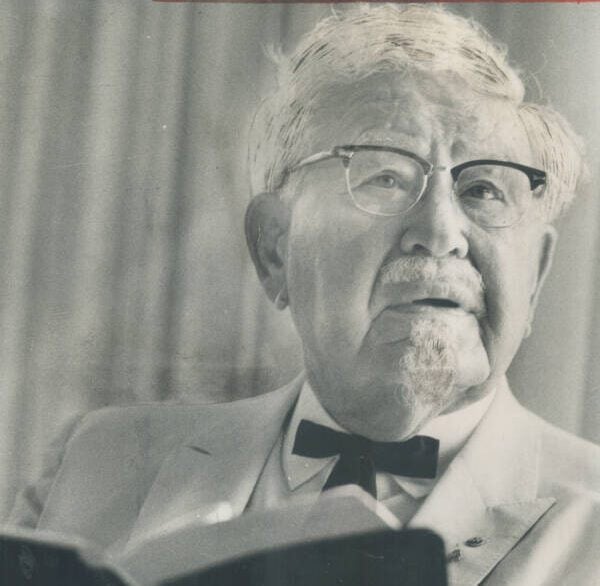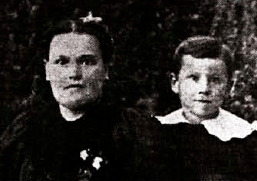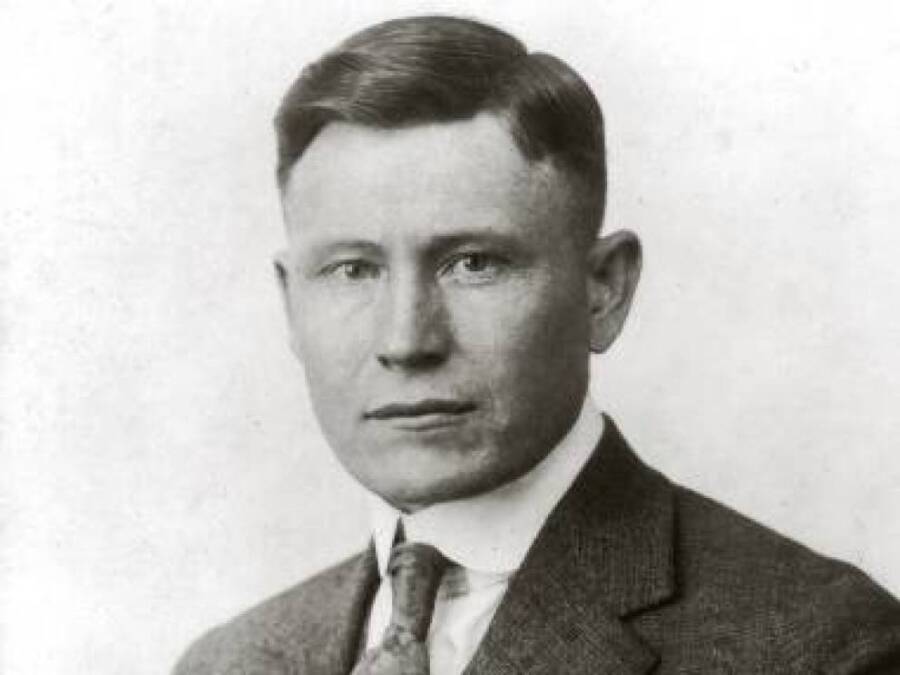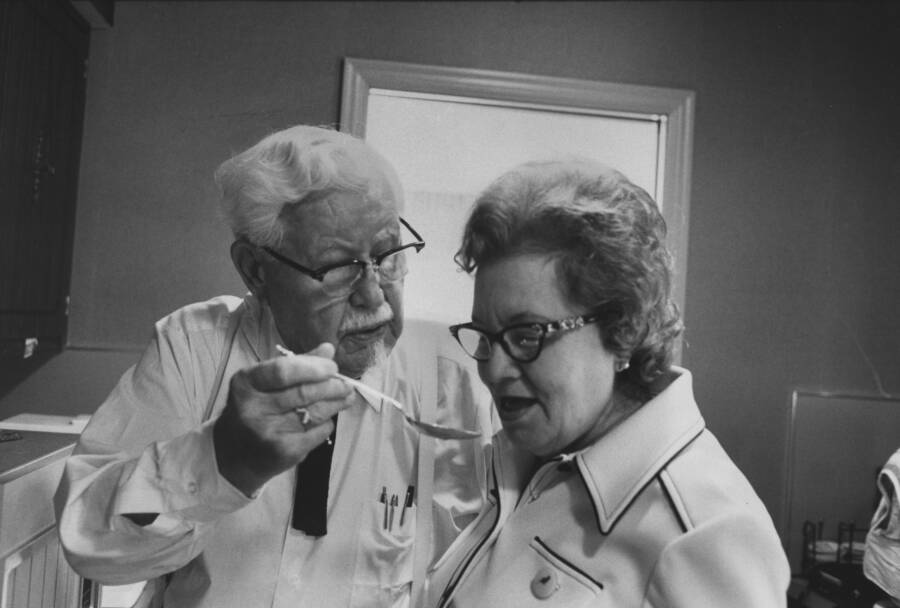Before he was the Colonel, Harland Sanders sold insurance, tires, and gas before he stumbled into the fried chicken business and became a household name.
Everything about him is familiar: the salt-white goatee, the gentleman farmer’s duds, and the slight drawl that all promise the crunch of chicken and finger-lickin’ gravy, made from, yes, 11 herbs and spices. He’s Harland David Sanders — better known as Colonel Sanders — and he has been serving up comfort food from Halifax to Hanoi for decades.
Before he was the grandfatherly Colonel, though, Harland Sanders bounced around North America as a steam engine worker, an insurance man, and a gas station worker.

Fred Ross/Toronto Star via Getty ImagesThe story of Harland Sanders, known popularly as Colonel Sanders, is often considered that of the American Dream as he went from a farmer’s son to a chicken king.
This is the story of how a farm boy became the Colonel and how a gas-station greasy spoon blossomed into Kentucky Fried Chicken.
The Makings Of Colonel Sanders
Harland David Sanders was born on September 9, 1890, in Henryville, Indiana, to a farm-working father and a taskmaster mother. When his father died and his mother went to work at a cannery, Sanders became the primary caregiver for his two younger siblings at seven years old and he mastered all the homemaking skills before he was eight, namely, cooking and food preparation.
Sanders holds no ill will for how quickly he had to grow up and thanked his mother for imbuing him with the responsibility and drive that later served him well:
“We knowed enough not to burn the house down — I don’t know why kids are so different today. We was already firmly disciplined. Mom didn’t spare the rod if we disobeyed her. And usually we didn’t, because we knew she knew better. Whatever Mom said went.”

Harland David Sanders at about age seven with his mother.
Sanders’ mother eventually remarried and he found himself out of the house around 12 years old when his stepfather turned out to be nothing of the fathering sort. Sanders then decided he had enough of school in 7th grade. He recalled:
“When I started class that fall, they had algebra in our arithmetic… Well, I couldn’t conceive any part of it. The only thing I got out of it was that x equaled the unknown quantity. And I thought, Oh, Lord, if we got to wrestle with this, I’ll just leave — I don’t care about the unknown quantity. So my school days ended right there near Greenwood, Indiana, and algebra’s what drove me off.”
From here, Colonel Harland Sanders’ story takes some turns. He rambled through Indiana doing farm work and then put out fires along the railroad in Alabama. He was often paid less than $15 a month with room and board.
Sanders worked on steamboat ferries out west and in justice courts in Arkansas, he sold insurance, lamps, and tires, and worked as the secretary to the Indiana Chamber of Commerce. He married at 19 to Josephine King and together they had three children. He served in the U.S. military in Cuba for a spell — though not as a colonel as that title has an entirely different backstory.
This went on for about 28 years until, eventually, Sanders found himself face-to-face with his destiny in Kentucky.
Highways, Hijinks, And Murder In Kentucky
Harland Sanders found himself in possession of a little gas station in Corbin, Kentucky, just off the highway. He began selling leftover meals to hungry travelers, simple meals, like he’d have made for his young siblings in Indiana: country ham, string beans, okra, fluffy biscuits — and fried chicken.
Sanders’ stop proved so lucrative, in fact, that he began to advertise on the highway to draw in travelers in need of a home-cooked meal. The restaurant grew day by day as demand ballooned — particularly for his unbeatable chicken.
It was around this time, too, in 1935, when the honorary title of “Colonel” was bestowed upon him by Kentucky Governor Ruby Laffoon for his service to his community and entrepreneurship.

TwitterA photograph of a younger Colonel Harland Sanders.
But the success of the station drew ire from the competition: namely, Matt Stewart, who owned the nearby Standard Oil station. One day, Sanders caught Stewart painting over his highway billboard. Stewart apparently had hoped that by siphoning off traffic to Harland Sanders’ station, he could damage the future-Colonel’s business. Sanders threatened to “blow [his] goddamn head off.”
But Stewart wasn’t deterred. Colonel Sanders caught him red-handed again and a shootout ensued.
One of the representatives at Sanders’ station, Robert Gibson, caught a bullet and died. Stewart faced a sentence of 18 years in prison for Gibson’s violent murder. As for Harland Sanders, all charges were dropped after his arrest. With the other game in town permanently shelved Sanders took advantage of the vacuum and business boomed. The first bonafide Kentucky Fried Chicken franchise opened in Utah in 1952, and thus, KFC was founded.
He was soon able to close the gas pumps entirely and open an entire 142-seater restaurant. Here he met his second wife, a young waitress in his employment named Claudia. They wed in 1949 after a two-year affair which ended in his divorce from his first wife, Josephine.
Colonel Harland Sanders may have felt he had already made it, but misfortune was just around the corner.
Harland Sanders Starts The KFC Empire
1950s America saw a myriad of changes. The post-World War II boom also meant an infrastructure boom which became obvious during the Eisenhower administration with the increased construction of highways.
One such highway cut through Harland Sanders’ neck of the woods and rerouted traffic about seven miles away from his place.
Starved for business, Harland Sanders couldn’t even sell the building at a loss. By this time, he’d mastered pressure frying chicken in a pressure cooker which by this time was still considered a new invention — this is not to mention the 11 herbs and spices which spoke for themselves.
He introduced his methods to other restauranteurs and engaged in small franchise agreements. He was often paid four cents for every chicken the restaurant cooked and sold with his process. Emboldened by this, 66-year-old Sanders decided to hit the road: If they couldn’t get business to come to them, the Sanders decided, they’d take themselves to the business.
“My wife and I slept in the car many nights while we waited for a restaurant to open so we could go into our sales pitch,” Colonel Sanders recalled. Besides, the pressure cooking method was perfect for mobile operation as the process not only cooked the food faster but kept it fresh.
The road to franchising wasn’t short, but it was fruitful. The same highways that choked them for business brought Colonel Sanders a fortune. Sanders would saunter into whichever restaurant he and Claudia happened upon and pitch them his chicken. If the employees were impressed, they’d make a deal to sell some of the Colonel’s chicken and give him a portion of the profit.
Harland Sanders dug his heels into marketing his persona around this time, too. He donned the weeds of a southern planter gentleman, indicative of myriad symbolism for the American South — white cotton suits and string ties. He dyed his hair and goatee white.
He and Claudia were kept busy making arrangements with other franchises, keeping their own books, and packaging their own herb and spice recipes. Indeed, the Colonel never did share his secret recipe so that no one could have the exact medley to sell to competitors.
Instead, he and Claudia would package the famed herbs and spices and ship them to other franchises themselves. In many ways, Claudia was actually the secret ingredient to the Colonel’s later success. As she said herself: “While he was out selling, I was home doing the work.”
In addition to encouraging him to franchise in the first place, she boxed much of the packages shipped to the franchises, wore an Antebellum getup to match his planter’s outfits, and she traveled throughout the world with him to inspect their myriad KFCs. She even opened her own place called Claudia Sanders Dinner House.
Meanwhile, Harland Sanders was nearing his golden years, but he insisted that “work don’t hurt nobody — work is wonderful for you…you’ll rust out quicker ‘n you’ll wear out.”
This ethic paid off. By late 1963, the Colonel had more than 600 outlets for his chicken in America and Canada, not to mention 400 additional foreign franchises.
Selling The Sizzle And Hens In The Sanders House
For Colonel Sanders, expanding his business was never just about the money. His name and his legacy were baked into the same recipe as his chicken and he worked hard to maintain a high level of quality. Sanders was even known to deny hopeful franchisees if he didn’t think their outfit was up to snuff.
He and his wife once drove nearly 2000 miles to Illinois to check out a potential location. He mused:
“We got in there just after dark, and as soon as I looked at the daggone place I was afraid the trip was for nothing. I got out of the car and went around to see what the back end looked like. They had a glass door in the kitchen and I could see in, and I knew immediately I didn’t want to put the chicken in there. So I went back to the car and we come on home. The owner don’t know yet today that I ever did see that joint.”
Additionally, one KFC executive recalled:
“If you were a franchisee turning out perfect gravy but making very little money for the company… and I was a franchisee making lots of money for the company but serving gravy that was merely excellent, the Colonel would think that you were great and I was a bum. With the Colonel, it isn’t money that counts, it’s artistic talent.”
He’d visit the various franchises and sample their output. If he found it lacking, he’d treat the owner to a profanity-laced soliloquy. Once he simply stated that the too-thick gravy a franchise was serving “ain’t fit for my dogs.”
Eventually, Harland Sanders sold the business for a sort of disappointing $2 million in 1964. It had become a bit too big to handle at this point and a sales-hungry young business offered him some stock in the new company, a $40,000 a year salary from the business, and continued access to the franchise. The new company owner, young businessman John Y. Brown Jr., saw great potential in the marketability of the Colonel himself.
Colonel Harland Sanders’ folksy aura and iconic duds had certainly become bigger than the chicken. The Colonel’s appeal mattered even more than perfectly spiced, shatteringly crunchy chicken slathered in gravy that could make a boot taste good. The Colonel began to run the late-night talk show circuit.
But for a man who peddled the image of a traditional family man, Colonel Sanders was more than modern when it came to the women in his life. Sanders’ appetite for hens, as well as fried chicken, wasn’t light. Reports of him making disparaging remarks and unwanted advances aren’t few and far between.
Colonel Harland Sanders’ daughter Margaret recorded in her memoir how even late in life the Colonel was a frisky sort. “Suddenly, during a lull in our conversation, we heard Father say, ‘I had sex until my 83rd birthday. How long did you have sex?'”

John Olson/ The LIFE Images Collection via Getty Images/Getty ImagesColonel Harland Sanders gives Claudia a taste of the cooking in 1974.
Perhaps his old age had made the Colonel feistier and more prone to perfectionism. It wasn’t long before the Colonel couldn’t stomach mediocrity within his franchises at all anymore and when Heublein Inc. bought ought KFC, he took them to court in 1974 for tainting his reputation and not holding up to his standards. He won one million in the process.
The Ongoing Story Of Colonel Sanders
Colonel Sanders died on December 16, 1980, at the age of 90 in Louisville, Kentucky. Having joined Ronald MacDonald and Wendy among the pantheon of fast food icons, his legacy — and marketing strategy — live on.
Colonel Harland Sanders has been portrayed in the media by Darrell Hammond, Norm MacDonald, and more recently Reba McEntire and the current “hot” CGI colonel for the Instagram-age.
KFC’s management doesn’t mind stoking the public’s ire here; Greg Creed, CEO of the KFC parent company Yum! Brands >commented: “I am actually quite happy that 20 percent hate it, because now they at least have an opinion,” adding “They’re actually talking about KFC, and you can market to love and hate; you cannot market to indifference.”
As for those 11 herbs and spices, no one is exactly sure what they are, and for a time, the Colonel claimed the franchise had even stopped using his original recipe. KFC makes a big show of keeping it secret, however, and admits that:
“In the 1940s, Colonel Sanders developed the original recipe chicken to be sold at his gas station diner. At the time, the recipe was written above the door so anyone could have read it. But today, we go to great lengths to protect such a sacred blend of herbs and spices. In fact, the recipe ranks among America’s most valuable trade secrets…Lots of people through the years have claimed to discover or figure out the secret recipe, but no one’s ever been right.”
However, Colonel Sanders nephew, Joe Ledington, used to help package the ingredients shipped to the franchises. He alleges that the spice blend is a very particular medley of paprika, garlic salt, and the white-gold of white pepper.
“The main ingredient is white pepper,” he confessed “I call that the secret ingredient. Nobody (in the 1950s) knew what white pepper was. Nobody knew how to use it.” But perhaps with that secret out, everybody soon will.
From a farmers’ son to a fast-food king, the highs and lows of Harland Sanders’ life echo the post-war landscape of America. Replete with adventure, wandering, romance, failure, and great success, his life was more a five-course meal than a to-go fast food.
And Colonel Sanders’ story is certainly a finger-lickin’ good one.
After this look at the story of Harland Sanders, check out more about the wild world of fast food with the original version of Ronald McDonald and then read up on the backstories of other fast-food empires.





